Scientists are continually researching and discovering how the gut microbiome and over 100 trillion microbes living there impact the digestive system and the rest of the body. (1) Bacteria from the Bifidobacterium and Lactobacillus families are the most commonly used and safest probiotics for human health, with many specific strains offering multiple health benefits, including protection against pathogens, fermentation of beneficial compounds, aiding digestion, and fighting inflammation. (2)
Sports Research Daily Probiotics is one such product designed to support a healthy gut microbiome. With 60 billion colony-forming units (CFUs) of 12 different strains of Lactobacillus, Bifidobacterium, and Lactococcus, along with inulin fiber, this supplement claims to help minimize the bloating, gas, and discomfort you may experience after eating and promote a healthy balance of good bacteria in your gut.
Keep reading for a dietitian’s review of this popular gut health supplement to decide if Sports Research Daily Probiotics is the best probiotic for your digestive health.
Medical disclaimer: This article is intended for educational and informational purposes only. It is not intended as a substitute for medical advice. For health advice, contact a licensed healthcare provider.
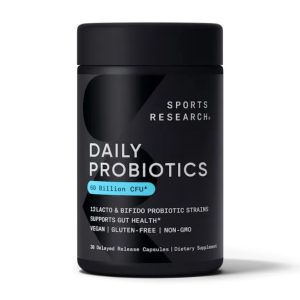

Key product features
What you should know
Sports Research Daily Probiotics is a vegan, third-party-tested probiotic supplement designed to support a healthy gut. Its wide variety of commonly used strains makes it a good option for general gut health but may not be ideal for targeted concerns.
- Each serving of Sports Research Daily Probiotics has 60 billion CFUs of 12 strains from the well-studied Lactobacillus, Bifidobacterium, and Lactococcus families.
- Each serving costs $0.83 on Amazon or $0.75 with the subscribe and save option. The price per serving is lower than many other comparable probiotics.
- This may be a good option as a general probiotic to support a healthy gut, not as a targeted solution for a specific health condition, as it has a wide variety of strains.
- Most people should tolerate the small amount of inulin added, but some sensitive individuals or those with inflammatory bowel disease may find it causes digestive upset. (3)
Sports Research Daily Probiotic overview
This particular probiotic supplement includes 60 billion CFUs from a blend of 12 probiotic strains:
- Lactobacillus plantarum
- Lactococcus lactis subsp. Lactis
- Bifidobacterium animalis subsp. lactis
- Lactobacillus acidophilus
- Lactobacillus fermentum
- Lactobacillus rhamnosus GG
- Lactobacillus casei
- Lactobacillus paracasei
- Bifidobacterium bifidum
- Bifidobacterium breve
- Bifidobacterium longum subsp. Infantis
- Bifidobacterium longum subsp. longum
Unfortunately, the bottle does not list the individual amounts of each probiotic strain, making it difficult to determine its potential benefits for certain health issues. But research suggests that the variety of strains included support healthy digestion and a strong immune system. (2)
The CFU count is measured at the time of manufacture, and the amount isn’t guaranteed at time of consumption. Sports Research also recommends refrigerating the supplement. Probiotic bacteria are live organisms that can die off if not stored correctly, meaning you may be consuming less than the CFUs listed on the bottle.
This probiotic supplement also contains 60 mg of inulin fiber from organic acacia senegal gum, organic apple fiber pomace, and organic inulin from Jerusalem artichoke and agave.
It’s certified vegan, non-GMO, and third-party tested. While the third-party testing information is not readily available on the website, you can enter your product information to view a certificate of analysis for full product transparency.
Our team product tester took this supplement daily for a few weeks and experienced no negative side effects—though she couldn’t pinpoint any specific benefits either. She noted the capsule was easy for her to take and didn’t have a taste. She enjoyed only needing to take one capsule too, unlike some other probiotic supplements.
Sports Research Daily Probiotics benefits
This supplement includes six Lactobacillus strains, including L. plantarum, L. acidophilus, L. fermentum, L. rhamnosus GG, L. casei, and L. paracasei. L. acidophilus, in particular, is known to help reduce harmful pathogens in the GI tract while improving lactose digestion in those with lactose intolerance. (11)
You’ll also find five bifidobacterium strains, including B. animalis subsp. lactis, B. bifidum, B. breve, B. longum subsp. infantis, and B. longum subsp. longum. Several Bifidobacterium strains, including B. animalis, B. bifidum, B. infantis, and B. longum promote regularity and reduce constipation, while B. longum subsp. infantis and B. breve may reduce virus-associated diarrhea. (12, 13)
The last strain is Lactococcus lactis subsp. lactis, which is known for its immune system-stimulating properties and antioxidant activity, helping to support the immune system. (14)
These potential benefits could be enhanced with the addition of a fiber inulin blend, which supports the growth of beneficial bacteria in the digestive tract, and may have added benefits like supporting healthy lipid levels, increasing mineral absorption, decreasing constipation, and having a positive influence on mood. (15) Fiber also feeds the probiotics (it is known as a prebiotic), which helps keep the probiotic bacteria alive as it works its way to the intestines.
How to use Sports Research Daily Probiotics
Sports Research Daily Probiotics is delivered in a single delayed-release capsule and should be taken once daily, ideally with food. Eating before you take the probiotic may help more bacteria survive the route to the large intestine, as food helps neutralize the acid in your stomach. (4)
One study found that people taking B. longum and L. rhamnosus—two strains included in Sports Research Daily Probiotics—for one month reduced harmful bacteria and increased beneficial gut bacteria. (5) This effect was seen whether the probiotic was taken 30 minutes before or after a meal.
How consistently you take this probiotic is more important than when you take it. While some probiotic strains may help with specific concerns, like reducing diarrhea symptoms in a matter of days, many probiotic health benefits take anywhere from two to 12 weeks to occur. (6, 7)
If you’re unsure of how long to take this supplement or are concerned if it’s appropriate for a specific health concern, check with your healthcare provider first.
Sports Research Daily Probiotics side effects
Probiotic supplements, especially the strains used in Sports Research Daily Probiotic, are considered safe for most people. The most common side effects an overall healthy person may experience with Lactobacillus and Bifidobacterium strains include mild gas and bloating, which typically resolve after the digestive system gets used to the change in gut flora. (8)
However, for some, especially those with inflammatory bowel disease, certain probiotic strains in this supplement or the addition of inulin may increase uncomfortable gastrointestinal symptoms and abdominal pain. (9)
For the most part, Lactobacilli and Bifidobacteria are incredibly safe, with very little risk of infection or adverse effects beyond mild digestive discomfort. (10)
However, those who are immunocompromised will always want to check with their healthcare provider before taking Sports Research Daily Probiotics or any other probiotic supplement.
Sports Research Daily Probiotics cost
Each serving of Sports Research Daily Probiotics costs just $0.83, with a 30-day supply costing $24.95. You can save 10%-15% by choosing the subscribe and save option.
At under $1 per serving, this probiotic supplement is very budget-friendly compared to many other comparable probiotic supplements on the market.
What customers are saying
Sports Research Daily Probiotics gets high praise from Amazon reviewers, with an average of 4.6 out of 5 stars and 2,452 global ratings. Many reviewers love the quality, dose, and low price compared to many other probiotic brands, as well as the effectiveness of the probiotics.
“For the price, these have been my favorite probiotics I’ve used. It keeps my stomach feeling well all day, and I’ve never been more regular.”
Mr. Phoenix, Amazon
Many other customers feel the same way, noting the positive benefits they’ve experienced after adding this probiotic to their routine.
“Purchased these because they are time released. I have tried many probiotics and really think these made a difference. Seems to be one of the few that keeps my stomach under control,” says reviewer John D.
While many reviewers have found relief from digestive symptoms with this supplement, not everyone has had a positive experience. “I used it a few times as directed, and each time it gave me cramps,” says reviewer Darlene.
Another Amazon customer left a five-star review, but with a warning for those who are experiencing side effects: “A little icky that first few days, but then settled down to 1 cap every other day.”
Specs
| Price per serving | $0.83 |
| Servings per container | 30 |
| Serving size | One capsule daily |
| Probiotic strains | 12 |
| CFUs | 60 billion |
| Special diets | Vegan, gluten-free |
| Third-party tested | Yes |
We’ve featured Sports Research Daily Probiotics in:
- The best probiotic supplements, according to experts
- The best probiotics for men, according to a certified nutrition coach
- The best probiotics for women, according to a certified holistic nutritionist
- The best probiotics for IBS, according to registered dietitians
- The best probiotics for weight loss, reviewed by experts
Who Sports Research Daily Probiotics is recommended for:
Sports Research Daily Probiotic can be used by men and women over the age of 18 to help support:
- Relief from mild digestive symptoms like constipation, bloating, or gas related to diet
- A healthy immune system
- Improved digestion
Who Sports Research Daily Probiotics is not recommended for:
This supplement may not be appropriate for everyone. If you’re unsure, consult with your healthcare provider before trying this supplement. People who may want to avoid this probiotic blend include:
- Children and infants
- Anyone with severe GI conditions, including IBD or IBS
- People who have a compromised immune system
- Anyone who is pregnant or nursing
Compare Sports Research Daily Probiotics
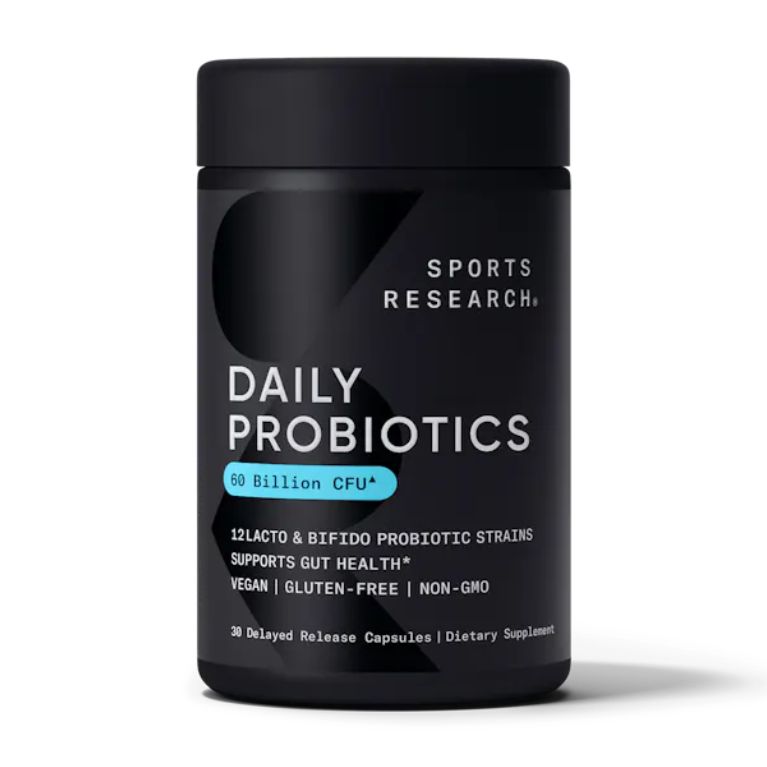
|
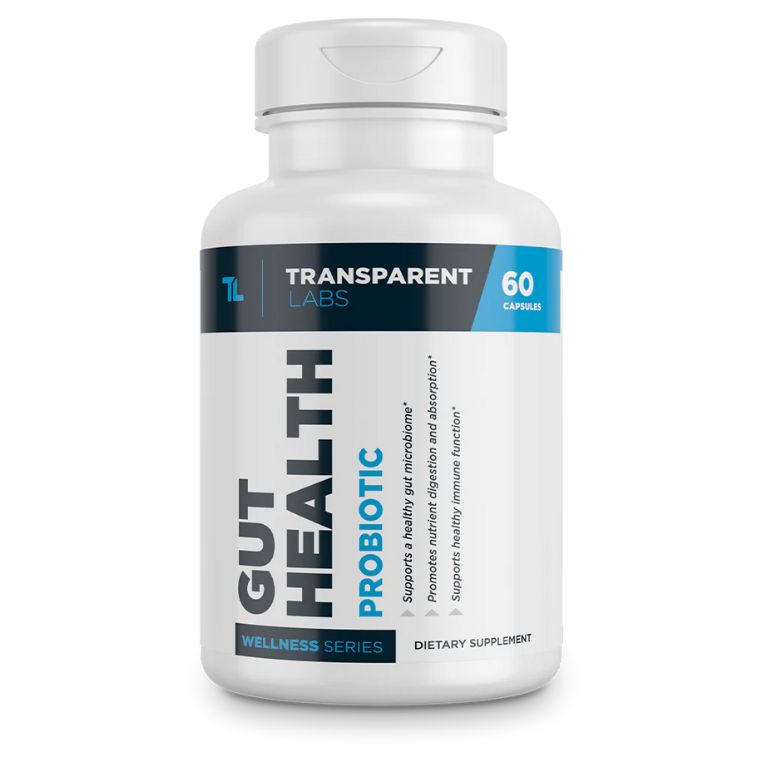
|
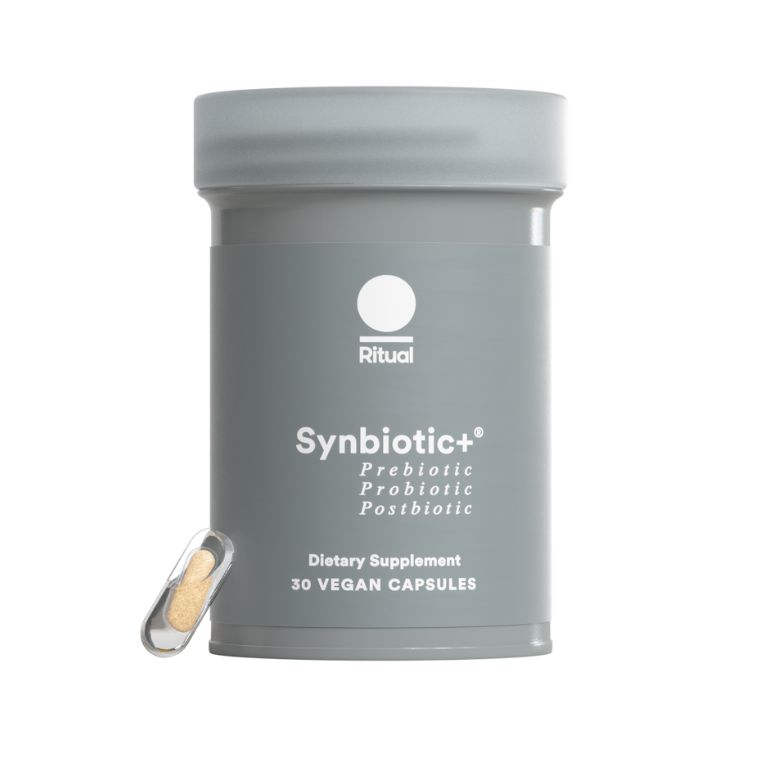
|
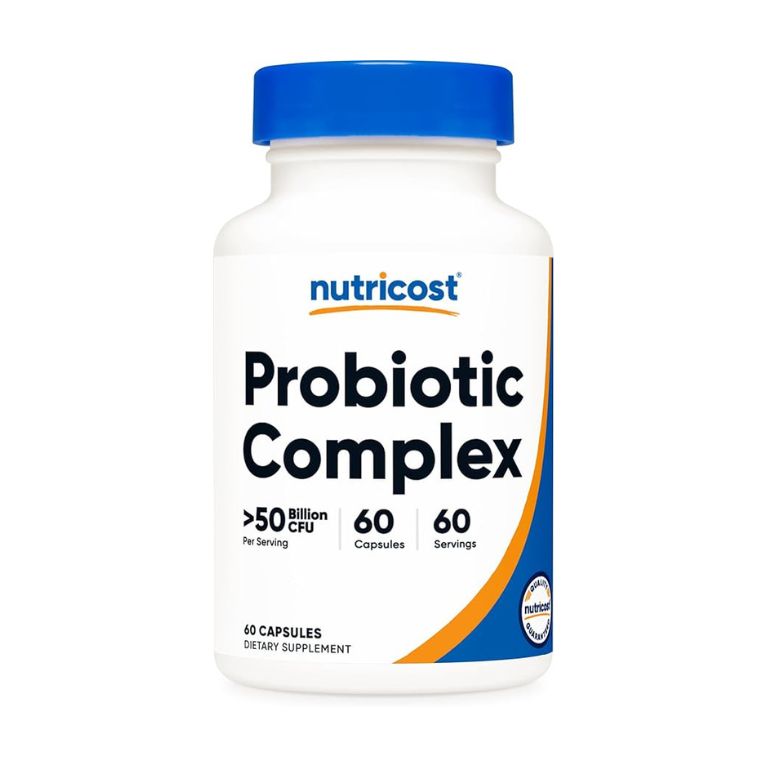
|
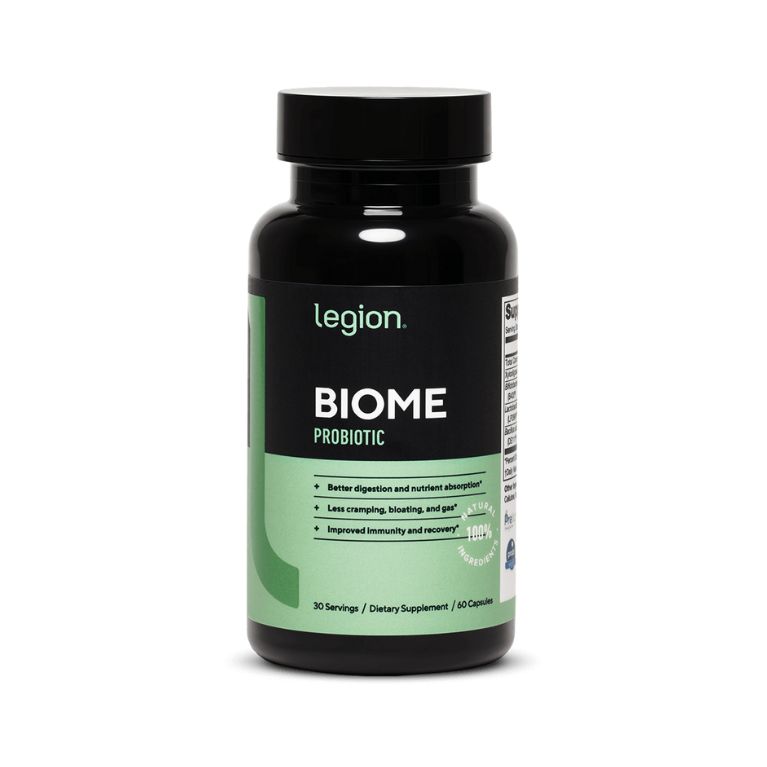
|
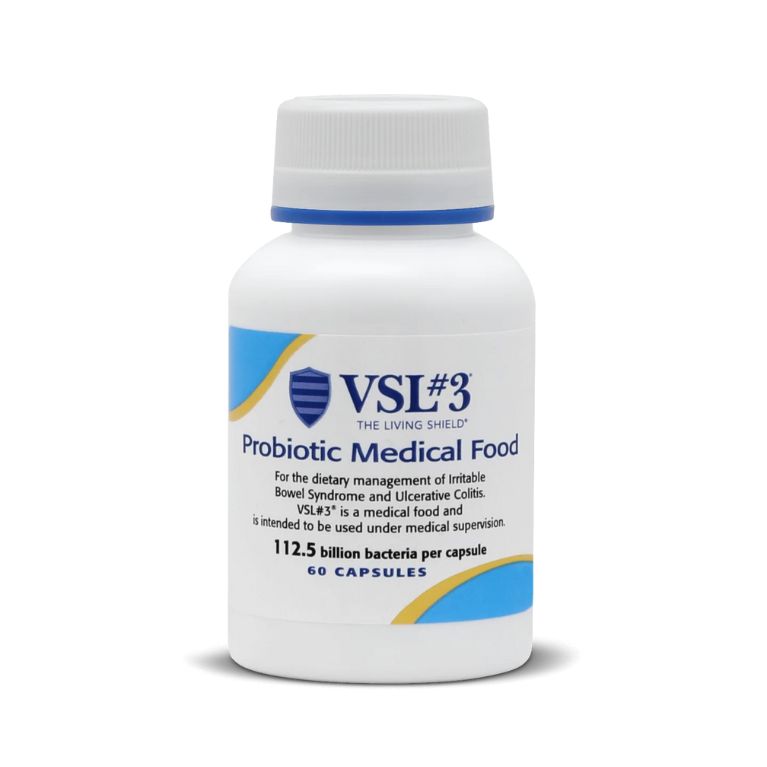
|
|
| Sports Research Daily Probiotics | Transparent Labs Gut Health | Ritual Synbiotic+ | Nutricost Probiotic Complex | Legion Athletics Biome | VSL#3 Capsules | |
| Rating | ||||||
| Cost per serving | $0.83 | $1.53 | $1.80 | $0.33 | $1.67 | $2.20 |
| Daily dose | 60 billion CFUs | 100 billion CFUs | 11 billion CFUs | 50 billion CFUs | 25 billion CFUs | 112.5 billion CFUs |
| Key ingredients | 12 Lactobacillus, Bifidobacterium, and Lactococcus strains | 10 Lactobacillus, Bifidobacterium, and Streptococcus strains | BB-12® (B. animalis subsp. lactis), LGG®, Tributyrin, PreforPro® | 10 Lactobacillus, Lactococcus, Saccharomyces, and Bifidobacterium strains | B. lactis, Bacillus subtilis, L. plantarum, PreticX® xylooligosaccharides | Streptococcus thermophilus, B. breve, B. lactis, L. acidophilus, L. plantarum, L. paracasei, L. helveticus |
How we test probiotic supplements
Our goal is to give you all the information you need to choose a supplement that aligns with your health goals and lifestyle. We extensively research all of the products included in our reviews, using our supplements testing methodology for scoring.
For our probiotic evaluations and reviews, we use our testing methodology and scoring system for probiotics. Based on our general testing methodology system, the probiotic testing and scoring is more specific and includes eight primary categories such as strain type and dose, testing for safety, and cost per serving.
Cultures contained–25%
The effectiveness of a probiotic product depends on the strains it contains, as different probiotic strains offer various health benefits. For example, some strains support digestive health, while others may help with immune function or address specific health conditions such as irritable bowel syndrome (IBS). It’s important to select probiotic strains that align with your health goals and needs. Probiotics are identified by their specific strain, which includes the Genus–or classification, or family–and species, which is a further identification within the “family” along with a strain designation.
Proprietary culture blend–25%
To make an informed choice when selecting probiotic supplements, it’s important to look for products that provide clear information about the specific strains of probiotics contained in the formulation. Proprietary blends often do not disclose the specific strains and their respective concentrations used in the product. Consumers cannot make informed decisions about the probiotic supplement without knowing the specific strains and their concentrations, which is a major disadvantage of proprietary blends. Different probiotic strains have different health benefits, and the effectiveness of a product depends on the specific strains used and their viability.
Encapsulated with food source–20%
Encapsulating probiotics with a food source like inulin can help protect the beneficial bacteria from harsh stomach acids and bile, increasing their chances of survival as they pass through the digestive system and reach the intestines where they are needed. This encapsulation can provide a protective barrier, potentially extending the shelf life of the probiotic supplement.
Live and active bacterial cultures–15%
According to an expert panel on probiotics and prebiotics, “Probiotics are live microorganisms which when administered in adequate amounts confer a health benefit on the host.” While most of the data support live and active cultures, some data suggest dead cultures could exert benefit as well, though they aren’t labeled as such and may be referred to as postbiotics or parabiotics. Since the “live and active cultures” number is what’s stated on labels for probiotics, if at all, we evaluate products based on whether they include a statement on their label confirming the presence of viable microorganisms
Colony forming units (CFU) at the end of shelf life date–10%
In the context of probiotics, CFUs represent the number of live microorganisms, typically bacteria, present in a probiotic supplement at the end of its shelf life. This value indicates the product’s potency and ability to deliver a sufficient quantity of live, beneficial microorganisms to exert their intended health effects. Generally speaking, it is better to have more strains and a variety of them, as our microbiome consists of approximately 38 trillion microbes. Therefore, it is best to have at least 20 billion or more CFUs, equivalent to a drop of water on a vast sea.
Type–5%
Probiotic supplements come in various forms, each with its own advantages and considerations. The choice of which form is best depends on individual preferences, needs, and factors such as convenience and lifestyle.
Certifications
Testing certifications show whether a dietary supplement contains what the brand says it contains in the doses advertised (potency).
Here are the certifications that stand out:
- Third-party testing
- NSF
- U.S. Pharmacopeia (USP)
- Labdoor
- Informed Sport
- Informed Choice (ICFS)
- Informed Ingredient
Bonus points
To recognize innovation and encourage healthy competition, we incorporate bonus credits into our scores. Bonus points provide a small boost to the product’s overall score and are equally weighted.
- Sustainable packaging
FAQs
Is Sports Research Daily Probiotics FDA-approved?
No. The FDA does not approve any dietary supplements. However, Sports Research Daily Probiotics is manufactured in a cGMP-certified facility, which meets strict quality standards set by the FDA.
How much does Sports Research Daily Probiotics cost?
Sports Research Daily Probiotics costs $24.95 for a 30-day supply, or just $0.83 per serving.
Can I take Sports Research Daily Probiotics every day?
Yes. This probiotic is made to be taken every day to support a healthy gut microbiome.
These statements have not been evaluated by the Food and Drug Administration. These products are not intended to diagnose, treat, cure, or prevent any diseases.
Our experts
Victoria Burgess, Ph.D., CSCS, CISSN
Victoria Burgess earned her Ph.D. in Health and Human Performance from Concordia University Chicago and holds her NSCA CSCS and Certified Sports Nutritionist (CISSN). She is an adjunct professor in the Human Performance and Nutrition department at Concordia University Chicago & Parker University, where she teaches undergraduate, graduate, and doctoral level courses.
Dr. Swathi Varanasi
Dr. Swathi Varanasi, or Dr. Swathi for short, is a pharmacist passionate about the intersection of personalized medicine and innovation. Dr. Swathi received her Doctor of Pharmacy (PharmD) at the Medical University of South Carolina and Bachelor of Arts (BA) at Carleton College. She co-founded and was the first-ever healthcare professional in the US to complete postdoctoral residency training in integrative medicine and preventative health. She also completed a postdoctoral fellowship in Medical Affairs in biotech and has training in nutrition from Cornell University.
Jessica Coulon
Jessica Coulon is a writer and editor who specializes in fitness, health, nutrition, and science content. Previously, she was an editor for Popular Mechanics and Bicycling, covering pro cycling news, writing how-to guides, and testing all the latest and greatest bike gear. She was also a regular shoe tester and contributor for Runner’s World. You can often find her skiing, riding her mountain bike, and racing with the F1RE female enduro team.
Joana Neziri, M.S., NASM CPT
Joana is a writer, editor, and content strategist focusing on nutrition, fitness, and all things health. After earning a master’s degree in business from the University of North Florida, she began a career in research and digital marketing.
Kelly Uhler
Kelly has a multifaceted background in elder care, health care, and copywriting. She has worked for organizations such as A Place For Mom and Homecare.com, which gave her the opportunity to work closely with families, providing reliable information to help them make informed decisions about their loved one’s health, safety, and quality of life.

Kelsey Kunik
Media Dietician
About Author
Kelsey Kunik is a registered dietitian with 5+ years of experience writing SEO nutrition and wellness content. She writes editorial and commerce content for several national online publications, such as Eat This!, Healthline, Livestrong.com, and Clean Plates, and have been featured as a nutrition expert in hundreds of published articles in top-tier outlets.
References
- Ferranti EP, Dunbar SB, Dunlop AL, Corwin EJ. 20 things you didn’t know about the human gut microbiome. J Cardiovasc Nurs. 2014;29(6):479-481. doi:10.1097/JCN.0000000000000166 https://www.ncbi.nlm.nih.gov/pmc/articles/PMC4191858/
- Matera M. Bifidobacteria, Lactobacilli… when, how and why to use them. Global Pediatrics. 2024;8:100139. doi:10.1016/j.gpeds.2024.100139 https://www.sciencedirect.com/science/article/pii/S2667009724000071
- Sheng W, Ji G, Zhang L. Immunomodulatory effects of inulin and its intestinal metabolites. Front Immunol. 2023;14:1224092. Published 2023 Aug 10. doi:10.3389/fimmu.2023.1224092 https://www.ncbi.nlm.nih.gov/pmc/articles/PMC10449545/
- Wang Y, Wen L, Tang H, Qu J, Rao B. Probiotics and Prebiotics as Dietary Supplements for the Adjunctive Treatment of Type 2 Diabetes. Pol J Microbiol. 2023;72(1):3-9. Published 2023 Mar 24. doi:10.33073/pjm-2023-013 https://www.ncbi.nlm.nih.gov/pmc/articles/PMC10280329/
- Toscano M, De Grandi R, Stronati L, De Vecchi E, Drago L. Effect of Lactobacillus rhamnosus HN001 and Bifidobacterium longum BB536 on the healthy gut microbiota composition at phyla and species level: A preliminary study. World J Gastroenterol. 2017;23(15):2696-2704. doi:10.3748/wjg.v23.i15.2696 https://www.ncbi.nlm.nih.gov/pmc/articles/PMC5403748/
- Li Z, Zhu G, Li C, Lai H, Liu X, Zhang L. Which Probiotic Is the Most Effective for Treating Acute Diarrhea in Children? A Bayesian Network Meta-Analysis of Randomized Controlled Trials. Nutrients. 2021;13(12):4319. Published 2021 Nov 29. doi:10.3390/nu13124319 https://www.ncbi.nlm.nih.gov/pmc/articles/PMC8706888/
- Zhang H, Yeh C, Jin Z, et al. Prospective study of probiotic supplementation results in immune stimulation and improvement of upper respiratory infection rate. Synth Syst Biotechnol. 2018;3(2):113-120. Published 2018 Mar 12. doi:10.1016/j.synbio.2018.03.001 https://www.ncbi.nlm.nih.gov/pmc/articles/PMC5995450/
- Williams NT. Probiotics. Am J Health Syst Pharm. 2010;67(6):449-458. doi:10.2146/ajhp090168 https://pubmed.ncbi.nlm.nih.gov/20208051/
- Dore MP, Bibbò S, Fresi G, Bassotti G, Pes GM. Side Effects Associated with Probiotic Use in Adult Patients with Inflammatory Bowel Disease: A Systematic Review and Meta-Analysis of Randomized Controlled Trials. Nutrients. 2019;11(12):2913. Published 2019 Dec 2. doi:10.3390/nu11122913 https://www.ncbi.nlm.nih.gov/pmc/articles/PMC6950558/
- Pradhan D, Mallappa RH, Grover S. Comprehensive approaches for assessing the safety of probiotic bacteria. Food Control. 2019;108:106872. doi:10.1016/j.foodcont.2019.106872 https://www.sciencedirect.com/science/article/abs/pii/S095671351930461X
- Gao H, Li X, Chen X, et al. The Functional Roles of Lactobacillus acidophilus in Different Physiological and Pathological Processes. J Microbiol Biotechnol. 2022;32(10):1226-1233. doi:10.4014/jmb.2205.05041 https://www.ncbi.nlm.nih.gov/pmc/articles/PMC9668099/
- Chen J, Chen X, Ho CL. Recent Development of Probiotic Bifidobacteria for Treating Human Diseases. Front Bioeng Biotechnol. 2021;9:770248. Published 2021 Dec 22. doi:10.3389/fbioe.2021.770248 https://www.ncbi.nlm.nih.gov/pmc/articles/PMC8727868/
- O’Callaghan A, van Sinderen D. Bifidobacteria and Their Role as Members of the Human Gut Microbiota. Front Microbiol. 2016;7:925. Published 2016 Jun 15. doi:10.3389/fmicb.2016.00925 https://www.ncbi.nlm.nih.gov/pmc/articles/PMC4908950/
- Jeong H, Kim S, Hwang US, Choi H, Park YS. Immunostimulatory Activity of Lactococcus lactis subsp. lactis CAB701 Isolated from Jeju Cabbage. Microorganisms. 2023;11(7):1718. Published 2023 Jun 30. doi:10.3390/microorganisms11071718 https://www.ncbi.nlm.nih.gov/pmc/articles/PMC10385365/
- Qin YQ, Wang LY, Yang XY, et al. Inulin: properties and health benefits. Food Funct. 2023;14(7):2948-2968. Published 2023 Apr 3. doi:10.1039/d2fo01096h https://pubmed.ncbi.nlm.nih.gov/36876591/
